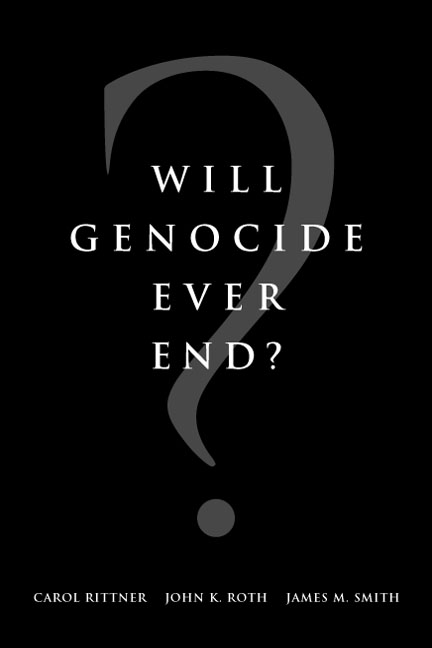Choice, April 2003
"Must Read"
—Today's Books, Abstract & Index, May 12, 2003
A Valuable Primer on Genocide
“Will Genocide Ever End? is a valuable primer in the terrible and persistent problem of genocide in human society. The contributors shed their academic garb and intellectual jargon to share plainly what they know about the causes, perpetration, and prevention of genocide. This book will serve to alert and inform the consciences of students, politicians, activists, and citizens alike, enabling us all to become more aware of the risk of genocide and more able to prevent it.”
—Hugo Slim, Reader in International Humanitarianism, Oxford Brookes University, United Kingdom
An Excellent Introduction to the Subject
“These short essays by some of the most distinguished specialists
in genocide studies provide an excellent introduction to the subject.
Clearly organized, focused, and authoritative, Will Genocide Ever End?
will be valued by readers eager to understand the ignoble past of
genocide and to consider useful approaches to combating it today.”
—Frank Chalk, Co-Director, Montreal Institute for Genocide and Human
Rights Studies, Concordia University, Canada
Insightful and Impresive Series of Well-Referenced Essays
“Will Genocide Ever End? provides an invaluable, insightful,
and impressive series of well-referenced essays prepared by leading experts,
discussing a range of issues around this dark side of humanity. One author
writes that genocide is “endless.” The wisdom and conviction
displayed within these covers lead me to believe that it need not be.”
—Margaret Cox, Professor of Forensic Archaeology and Anthropology
and Chief Executive of the Inforce Foundation, Bournemouth University,
United Kingdom
“Will Genocide Ever End? contains short essays and comments
by experts working on the cutting edge of some of the most difficult territory
of human social interaction. The contributors come from a variety of disciplines,
experiences, and areas of professional expertise, but they share one personal
concern that brings them together.
Over many years, all have observed genocide and its dark dimensions, and
more than anything, they hope their expertise will never again be necessary.”
—from the Introduction by Stephen D. Smith
TABLE OF CONTENTS
Illustrations
Preface
Introduction by
Stephen D. Smith
Chronology by
Carol Rittner, John K. Roth, and James M. Smith
PART I: WHAT IS GENOCIDE?
1. The Politics of Definition
John K. Roth
2. As Old As History
Roger W. Smith
3. The UN Convention
Steven L. Jacobs
4. Understanding the “G” Word
Stephen C. Feinstein
5. States of Genocide and Other States
Helen Fein
6. Ethnic Cleansing
Paul Mojzes
7. Population Elimination
Richard L. Rubenstein
PART II: WHAT ARE THE CAUSES AND
MECHANISMS OF GENOCIDE?
8. A Twentieth-Century Phenomenon?
Mark Levene
9. Circumstances of Modern Genocide
Robert Melson
10. Psychological Foundations
Clark McCauley
11. Mechanisms of Genocide
Eric Markusen
12. Using Rape as a Weapon of Genocide
Carol Rittner
13. Identifying Genocide
Linda Melvern
14. Understanding Genocide
Ervin Staub
PART III: WHAT CAN BE DONE ABOUT
GENOCIDE?
15. What Can Be Done?
David Nyheim
16. Identifying Precursors
Jennifer Leaning
17. Anticipating Genocide
Henry R. Huttenbach
18. Early Warning and Genocide Prevention
Barbara Harff
19. Controlling Genocide in the Twenty-First Century
Herbert Hirsch
20. Studying the Roots of Genocide
Ben Kiernan
21. Prosecuting the Perpetrators
Kurt Jonassohn
22. Using Civil Litigation to Achieve Some Justice
Michael J. Bazyler
PART IV: WILL GENOCIDE EVER END?
Genocide: Everyone’s Problem
John Heidenrich
24. A Task Whose Time Has Come
Samuel Totten
25. Genocide is History
Ahmedou Ould-Abdallah
26. War Crimes Trials
Richard Goldstone and Nicole Fritz
27. Will Genocide Ever End?
Hubert Locke
28. Cautious Optimism
James M. Smith
EPILOGUE
Beyond the Darkness?
Carol Rittner, John K. Roth, and James M. Smith
APPENDICES
Excerpts from Selected Documents
• Convention on the Prevention and Punishment
of the Crime of Genocide
• Statute of the International Tribunal for Yugoslavia
• Statute of the International Tribunal for Rwanda
• Statute of the International Criminal Court
Questions for Discussion
Selected Genocide Websites
Acronyms
Bibliography
Contributors
Index
CAROL RITTNER, R.S.M. is Distinguished Professor of Holocaust and Genocide
Studies at The Richard Stockton College of New Jersey (USA).
JOHN K. ROTH is the Russell Pitzer Professor of Philosophy at Claremont
McKenna College, California (USA).
JAMES M. SMITH is co-founder and Executive Director of the Aegis Trust,
a UK-based nongovernmental organization devoted to genocide prevention
(United Kingdom).




